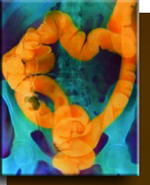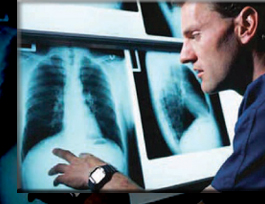Do you know that repeated respiratory infections, LUNG CANCER LUNG CANCER
.....The lungs contain many different types of cells. Most cells in the lungs are epithelial cells. Epithelial cells line the airways and produce mucus, which lubricates and protects the lung. The lungs also contains nerve cells, hormone-producing cells, blood cells, and structural or supporting cells. .....Lung cancer begins when cells in the lung grow out of control and form an abnormal cell. These abnormal cells can begin anywhere in the lung and reproduce faster and grow into abnormal tissue (lump/ tumors) in one or both of the lungs. .....Once a cancerous lung tumor begins to grow, can be carried away in blood, or float away in the natural fluid that surrounds lung tissue. When it moves into other part of the body through the bloodstream, it is called metastasis. The most common sites of spread are the lymph nodes, lungs, bones, brain, liver, and to the adrenal glands. Metastases from lung cancer can cause further breathing difficulties, bone pain, abdominal or back pain, headache, weakness, seizures, and/or speech difficulties. The location and size of the initial lung tumor, and whether it has spread determines the stage of lung cancer. .....The presence of cancer anywhere in the body can cause a person to feel unwell in a general way, but most people with lung cancer are diagnosed when the tumor grows, takes up space, or begins to interfere with nearby structures. A lung tumor can make fluid that can collect inside or around the lung (pleural effusion); or may also push the air out of the lungs blocking the flow of air into the lungs and cause the lung to collapse since the tumor is using the space required for oxygen to come in and carbon dioxide to go out of the lung.The good news is that Lung cancer is treatable when is early detected. .....For people with lung cancer who have no symptoms, their lung cancer can be discovered on a chest x-ray or CT scan performed for some other reason, such as checking for heart disease. ....People with lung cancer symptoms may experience fatigue and weakness that can further worsen breathing difficulties.Other symptoms are cough, shortness of breath, chest pain. If a tumor invades a structure within the chest or involves the lining of the lung, may cause loss of appetite that can result in weight loss; and coughing up phlegm or mucus, or coughing up blood (Hemoptysis). Repeated respiratory infections, such as bronchitis or pneumonia, can be a sign of lung cancer. Risk Factors and Prevention .....Each year more people are diagnosed with lung cancer.The rate of new cases is showing that men develop lung cancer more often than women. Although cigarette smoking is the main cause, anyone can develop lung cancer. ....Knowing your risk factors and communicating them to your doctor may help you make more informed lifestyle and health-care choices. ....Some risk factors can be controlled, such as smoking, and some cannot be controlled, such as age and family history. Tobacco. .....Most lung cancer occurs in people who smoke.Tobacco smoke damages cells in the lungs, causing the cells to grow abnormally. The risk to develop cancer is higher for people who smoke heavily and/or for a long period of time. To reduce their risk they have to stop smoking, but still their risk will still be higher than people who never smoked. Regular exposure to "secondhand" smoke can increase the risk even if that person does not smoke. Radon. .....Exposure to radon is associated with several types of cancer and is the second leading cause of lung cancer. Radon is an invisible, odorless gas naturally released by some soil and rocks. Radon enters a home through cracks in walls, basement floors, and other openings. It also may contaminate the water supply, especially in private wells. There is a greater risk for lung cancer when smokers also are exposed to radon. Most hardware stores have kits that test home radon levels. Asbestos. .....Most These are hair-like crystals often used as fireproof insulation in buildings. When asbestos fibers are inhaled irritates the lung. People in jobs such as shipbuilding, asbestos mining, insulation, or automotive brake repair and smoke have a higher risk of developing lung cancer. .....Attempts to prevent lung cancer with vitamins or other treatments have not worked. The Beta-carotene, related to vitamin A, has been tested for the prevention of lung cancer. It did not reduce the risk of cancer, actually the beta-carotene increased the risk of lung cancer in people who smoke. To learn more about Lung Cancer, please visit: www.lungusa.org More information about Radon and Asbestos, at www.epa.gov For information about Cancer, call the American Cancer Society at 1-800- ACS-2345 or visit their Web site at www.cancer.org |
||
|
||
|
||
Bienvenido a la primer revista dedicada al cuidado de la salud
 info
info
The first, the best & the only English & Spanish Magazine in San Diego, California
| ....LUNG CANCER | |||||
..LUNG CANCER AWARENESS > |
|||||
| .....BREAST CANCER | |||||
| EARLY DETECTION | |||||
| Mrs. Bush's Remarks in a Discussion at the Mexican Association Against Breast Cancer | |||||
| ....SKIN CANCER | |||||
Why You Should Know About Melanoma ....Melanoma is the most serious of the common type of skin cancer. The good news is that most melanomas can be found early and treated successfully. This brochure describes risk factors for this type of skin cancer, and important tips for finding it early.(PDF) |
|||||
| ...COLON CANCER | |||||
by The American Cancer Society
|
|||||
Colorectal cancer screening saves lives. ..If everyone aged 50 years old or older were screened regularly, up to 60% of deaths from this cancer could be avoided. >> CDC |
|||||
| March is National Colorectal Cancer Awareness Month! CMS | |||||
|
|||||
Prevention the Focus of New Colon Cancer Screening Guidelines |
|||||
| ..CAREGIVING | |||||
| How To Be an Effective Caregiver | |||||
| Talking with Your Doctor About Cancer-related Pain | |||||

